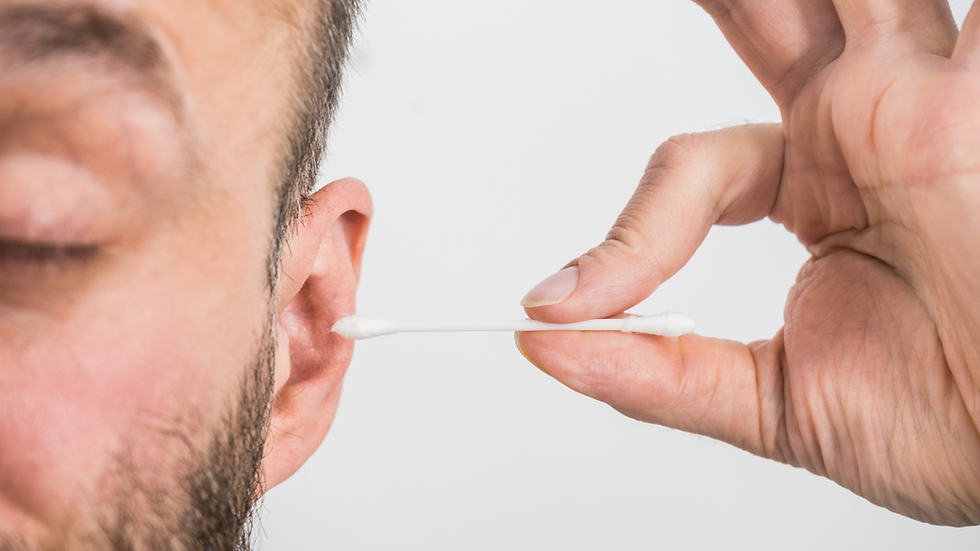Ear Pain and Pressure - Causes, Symptoms & Solutions
- Victoria Wermers, RN,MSN,FNP, PMHNP
- Sep 18, 2024
- 4 min read
Updated: Jun 24, 2025
Dealing with ear pain is tough—it has many causes, and because you can’t see inside your own ear, figuring out what’s wrong by yourself can be challenging. There are several common causes of ear pain and discomfort, one of which is discussed below: ear pain and pressure, with a brief mention of eardrum rupture. Other ear problems, like swimmers' ear and inner ear infections are discussed elsewhere on this site.
Ear Pain and Pressure - Causes, Symptoms & Solutions: Eustachian Tube Dysfunction (fluid behind the eardrum)
When patients experience ear pain, they often assume it’s an infection. However, symptoms may also be caused by fluid buildup and pressure behind the eardrum, a condition known as eustachian tube dysfunction. Because it’s impossible to see inside your own ear, telling the difference can be tricky. This guide—Ear Pain and Pressure: Causes, Symptoms & Solutions—is here to help you better understand the issue and, hopefully, find relief.
Excess pressure behind the eardrum can lead to pain, popping, distorted hearing, and sometimes, crackling. Sometimes, the pressure can cause dizziness because it creates pressure on the bones behind the eardrum, which are responsible for balance.
This eustachian tube dysfunction can be triggered by various factors such as changes in air pressure (from flying, high altitudes, or diving), allergies, trauma, including exposure to a sudden, extreme loud noise, or the discomfort can be due to ear or sinus infections.

Relieving Ear Pressure
There are a few ways a person can try to relieve pressure using a nasal decongestant, like Afrin Nasal Spray, in the nose before flying. Often, people who work on airlines know this "secret."
Avoiding More Ear Pressure:
Don't blow your nose too hard, and if you have "stuffy ears," please don't hold your nose and blow to clear them. Doing this can put a lot more pressure on your eardrums! (Nasal irrigants like Neti-Pots can do this as well.)
Over-the-Counter Treatment for Ear Pressure
Nasal corticosteroids (common: Flonase, Nasonex), nasal spray (takes a day or two to work). Use as directed and look down at the floor when spraying.
Oxymetazoline - (common: Afrin, Dristan, Zicam Nasal Sprays) - Great, immediate nasal decongestants. But (and remember this!!) you can only use this for two to three days; otherwise can develop rhinitis medicamentosa - also known as rebound congestion - you can't breathe without the nasal spray. Over time, using this continuously can cause damage to the nasal mucosa. The zinc in Zicam spray can help shorten cold symptoms, but occasionally causes a loss of smell.
Pseudoephedrine (common: Sudafed) - This is a good decongestant used to decrease congestion in the sinus, which can help decrease pressure in the ears lots of potential side effects. This has lots of potential side effects, including an increase in blood pressure and insomnia. It can also dry out mucus, making it thick and dry. Stay well hydrated if you use this.
Meclizine (common: Antivert) - For dizziness related to an inner ear problem. This blocks signals to the brain that are responsible for dizziness (it also helps with nausea and vomiting). This can also dry you out, so stay well hydrated if you use it.
Natural Measures Used to Eliminate Ear Pressure
Yawn
Try warm, moist compresses for 15 minutes three to four times a day
Chew gum
Prescriptive Treatment for Eliminating Ear Pressure
Corticosteroids may help get rid of inflammation within the sinus and eustachian tube, thereby relieving some pressure
Diuretics may decrease fluid accumulation behind the eardrum, in turn decreasing ear pressure
Antibiotics are used if an infection is present (see otitis media)
Note: Do not use ear drops if you have a hole in your eardrum.
Note: Ear pressure can be stubborn and very tough to eliminate with and without prescription medicine. If you think you may have a ruptured eardrum, do NOT use ear drops without consulting a healthcare provider. Some can do damage, and the only drops you can use are VERY SPECIFIC.
Eardrum Rupture
In the case of eardrum rupture, this pressure builds up, causing the eardrum to rupture, creating a hole for the escape of pressure. If an ear infection is present, the pain may intensify until the eardrum bursts, releasing purulent, pale yellow, or green fluid from the ear canal. In most cases, the sudden release of pressure often brings immediate relief from pain.
Usually, a ruptured eardrum will heal on its own in a few weeks, but if it is severe, it can require surgical repair. You can have hearing loss, but your hearing usually recovers well. A rupture is similar to a child having tubes placed in their ears: The tubes allow the infection to drain from behind the eardrum.
A suspected ruptured eardrum should be examined by a healthcare provider or an ENT to evaluate the severity of the problem, particularly if there is ongoing hearing loss.
Think it's not ear pressure? Explore other causes of ear discomfort:
Other Causes of Ear Discomfort (i.e., itchy ears)



